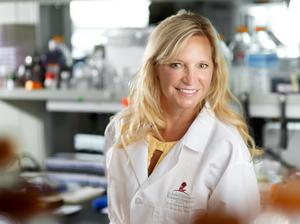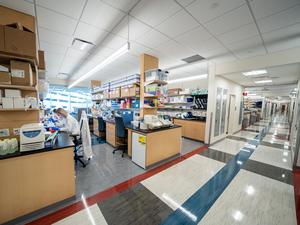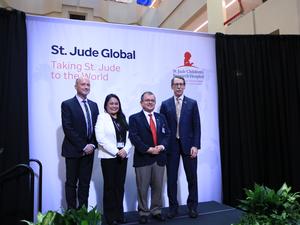
St. Jude Children's Research Hospital and the the World Health Organization (WHO) announced Monday, Dec. 13, a partnership to launch a new initiative, the Global Platform for Access to Childhood Cancer Medicines.
St. Jude will invest $200 million in the platform over the next six years and provide free-of-cost medication to countries participating in the pilot phase of the platform. The goal of the Global Platform for Access is to provide an uninterrupted supply of quality-assured and affordable childhood cancer care medication to low- and middle-income countries around the world.
“With this platform, we are building the infrastructure to ensure that children everywhere have access to safe cancer medicines,” said Dr. James Downing, St. Jude president and CEO, in a release.
The initiative is projected to help 120,000 children in 50 countries over the next six years.
Affordability and availability
The Global Platform for Access aims to address the disparity in childhood cancer care and survival rates worldwide and the financial and logistical challenges surrounding medicine availability. As a consolidated medication resource, the platform will also help curtail the purchase of substandard and falsified drugs, St. Jude said in a release.
The new platform is part of the continuing collaboration between the WHO and St. Jude, which began in 2018 when the WHO announced the Global Initiative for Childhood Cancer in partnership with St. Jude and other similar organizations. That initiative hopes to achieve a 60% survival rate for children with cancer by 2030. The first step toward attaining that goal is uninterrupted access to medicines, Downing said.
“Any disruption in medicine increases the chance for relapse and death," he said. "So this [new platform] is a key component of achieving those goals.”
According to the WHO, 400,000 children annually are diagnosed with cancer, and while the survival rate for those in high-income countries is 80%, that number drops to a mere 30% for children in low- and middle-income countries. Nearly 100,000 children are lost each year because of medication affordability and availability issues hindering treatment.
The lack of accessible and available care is a primary reason behind those numbers, and medicine availability plays a critical role, according to Dr. André Ilbawi, cancer control officer at the WHO. Ilbawi said in the release that the platform would not only enable them to work directly with governments, understand their needs, and facilitate delivery of the required medicines, but it will also help provide guidance on what medicines will give the optimal care and the greatest likelihood of surviving.
“We will bring partners around the world to the table to make realistic and practical change for children with cancer everywhere,” he said.
Pilot phase
During the pilot phase of the Global Platform for Access, a dozen or more countries are expected to participate in the first two years. The countries will be picked by an administrative body, currently under development by St. Jude and the WHO, and the announcement of the first participating countries can be expected by the second quarter of 2022.
Two countries from each of the six WHO regions will be chosen. The selection criteria will include “existing commitment of the government to control non-communicable diseases, including support for related services like diagnostic tests and sufficient capacity to receive, safely distribute, and prescribe cancer medicines,” said Dr. Catherine Lam, director of the Asia Pacific Regional Program and Health Systems Unit at St. Jude Global and co-director of the WHO Collaborating Centre for Childhood Cancer, in a statement to MBJ.
Along with existing processes in place, countries' transparency and accountability will also be part of the selection criteria. St. Jude will bear the cost of making the required drugs available to the nations during the pilot phase.
Demand in the chosen countries will dictate how much of different medications will be procured. The platform will review that demand alongside the needs that have been identified using internal forecasting tools and work with countries on the selection and prioritization of medicines, Lam said.
“The medicines will be selected from the WHO essential medicines list as recommended priority medicines to treat children with cancer," she said.
A procurement agency will also work along with St. Jude and the WHO to get the required medicines. The agency will be picked in early 2022. The platform will lean on the expertise of this agency, as well as St. Jude and the WHO, to implement appropriate monitoring, evaluation, and accountability mechanisms, Lam said.
“As I reflect back on the journey,” Downing said in the release, “this will be one of the most important things St. Jude Children's Research Hospital ever does.”









